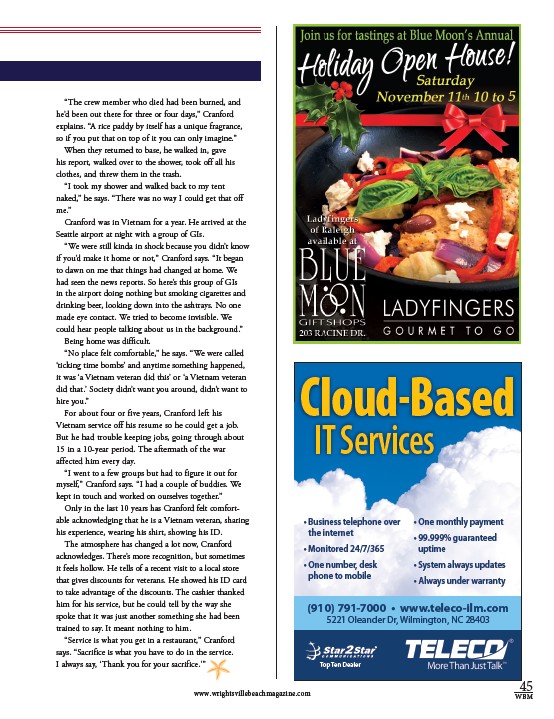
Cloud-Based
IT Services
45
“The crew member who died had been burned, and
he’d been out there for three or four days,” Cranford
explains. “A rice paddy by itself has a unique fragrance,
so if you put that on top of it you can only imagine.”
When they returned to base, he walked in, gave
his report, walked over to the shower, took off all his
clothes, and threw them in the trash.
“I took my shower and walked back to my tent
naked,” he says. “There was no way I could get that off
me.”
Cranford was in Vietnam for a year. He arrived at the
Seattle airport at night with a group of GIs.
“We were still kinda in shock because you didn’t know
if you’d make it home or not,” Cranford says. “It began
to dawn on me that things had changed at home. We
had seen the news reports. So here’s this group of GIs
in the airport doing nothing but smoking cigarettes and
drinking beer, looking down into the ashtrays. No one
made eye contact. We tried to become invisible. We
could hear people talking about us in the background.”
Being home was difficult.
“No place felt comfortable,” he says. “We were called
‘ticking time bombs’ and anytime something happened,
it was ‘a Vietnam veteran did this’ or ‘a Vietnam veteran
did that.’ Society didn’t want you around, didn’t want to
hire you.”
For about four or five years, Cranford left his
Vietnam service off his resume so he could get a job.
But he had trouble keeping jobs, going through about
15 in a 10-year period. The aftermath of the war
affected him every day.
“I went to a few groups but had to figure it out for
myself,” Cranford says. “I had a couple of buddies. We
kept in touch and worked on ourselves together.”
Only in the last 10 years has Cranford felt comfort-able
acknowledging that he is a Vietnam veteran, sharing
his experience, wearing his shirt, showing his ID.
The atmosphere has changed a lot now, Cranford
acknowledges. There’s more recognition, but sometimes
it feels hollow. He tells of a recent visit to a local store
that gives discounts for veterans. He showed his ID card
to take advantage of the discounts. The cashier thanked
him for his service, but he could tell by the way she
spoke that it was just another something she had been
trained to say. It meant nothing to him.
“Service is what you get in a restaurant,” Cranford
says. “Sacrifice is what you have to do in the service.
I always say, ‘Thank you for your sacrifice.’”
• Business telephone over
the internet
• Monitored 24/7/365
• One number, desk
phone to mobile
(910) 791-7000 • www.teleco-ilm.com
5221 Oleander Dr, Wilmington, NC 28403
Top Ten Dealer
®
• One monthly payment
• 99.999% guaranteed
uptime
• System always updates
• Always under warranty
www.wrightsvillebeachmagazine.com WBM